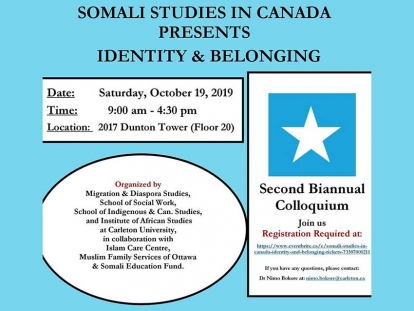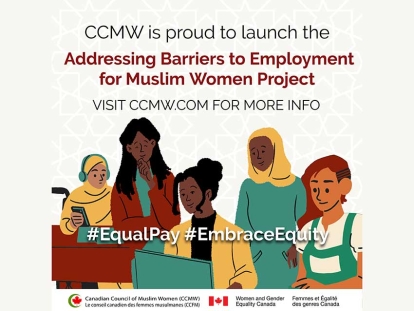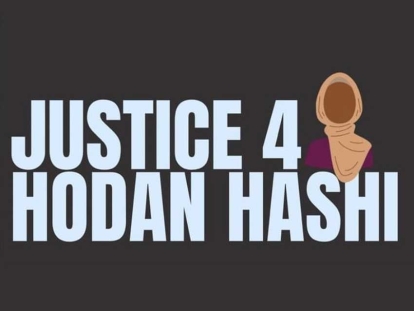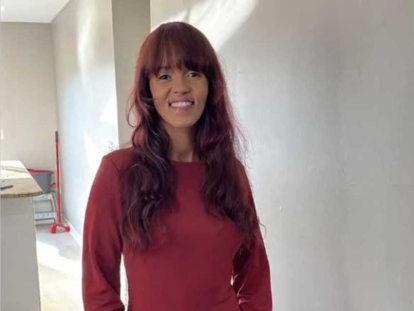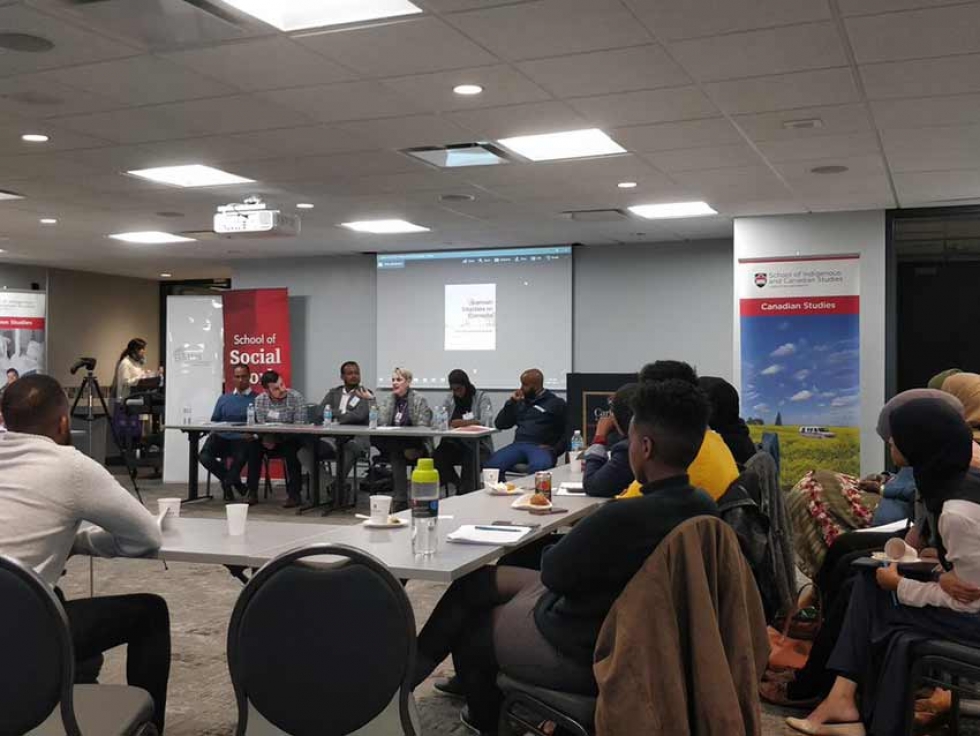 Coloniality & Racialization panel chaired by Dr. Awet Tewelde Weldemichael at the Somali Studies in Canada Colloquium in 2017.
Somali Studies in Canada Twitter Account
Coloniality & Racialization panel chaired by Dr. Awet Tewelde Weldemichael at the Somali Studies in Canada Colloquium in 2017.
Somali Studies in Canada Twitter Account
Mar
Diverse Participants Invited to Contribute to the Somali Studies in Canada Colloquium at Carleton University
Written by Somali Studies in CanadaCarleton University is happy to announce its second Somali Studies in Canada Colloquium, taking place on October 18 and 19, 2019.
This year’s theme, Identity and Belonging, will focus on the thematic priorities that emerged from the round-table discussions at the first Somali Studies in Canada Colloquium in 2017.
This second conference is designed to play a key role in facilitating dialogue and partnerships among the Somali Studies academic community at local, regional, and national levels.
We are interested in papers that address issues of identity for Somalis in Canada such as: identity conflict, historical trauma, the influence of less-studied periods of Somali history, cultural resurgence and practice, systemic barriers including access to higher education, economy and labour market integration, the promotion of well-being and social justice.
Interested academics, researchers, educators, and health and social work practitioners are invited to submit their work. We ask applicants to submit a 200-word abstract describing their proposed paper, their academic/professional biography (100 words) and a full paper (approximately 5000-7000 words, including references).
The accepted papers will also be submitted for publication in an edited volume following the conference.
Papers may include but are not limited to theoretical and conceptual academic studies, reports on empirical research, poems and reflections by community practitioners, activists, and artists based on the following topics:
Revisiting the Past:
- 15th-19th-century Somali history, as well as historic cultural and spiritual traditions and their contemporary manifestations in the diaspora;
- The colonial period (19th century to 1960) and its lingering effects on Somali Canadians;
- Somali migration to and presence in Canada in the post-independence (1960-1969) and pre-war Socialist (1969-1991) periods;
- The influence of historical Somali intellectuals, writers, and leaders.
Addressing Present Challenges:
- Post-war Islamic politics;
- Post-colonial struggles and dealing with historical trauma;
- Somali Canadian youth in distress (criminalization, bi-cultural distress, media misrepresentation);
- Addressing issues of well-being (mental and physical health);
- Identifying barriers to higher education and recommendations.
Envisioning The Future:
- Establishing a vision for inclusive spaces and strengthening Somali-youth-led organizations;
- Challenging stereotypes through inclusive media;
- Decolonizing Somali-centred scholarship;
- Nurturing cultural identity through Somali traditional arts, prose, poetry, and songs.
Application deadline: March 15, 2019.
Please send your papers, abstracts and biographies to: Dr. Nimo Bokore This email address is being protected from spambots. You need JavaScript enabled to view it.
Dr. Nimo Bokore, who is a professor of Social Work at Carleton University, organized the first Somali Studies in Canada Colloquium in 2017.
In an interview with York University in 2018, Dr. Bokore discussed how she was able to organize this unique event, "The Carleton School of Social Work is a structural school. It hosts the only Institute of African Studies in Canada and the Migration and Diaspora Studies Initiative, which focuses on the social, economic, cultural and political implications of the movement and transnational settlement of people. I am cross appointed in both faculties, and as a result I was able to organize the first ever Somali Studies colloquium in Canada. There were over 100 registered participants, and 30 presenters, presenting their work in England, Netherlands, South Africa, Kenya and at various universities in Canada."
In the video below, Dr. Bokore discusses how her experiences as a Somali refugee informed her research interest into the impact of historical trauma across generations. (It may take a few moments fro the video to load from YouTube.)
The organizing committee of the 2019 colloquium includes Dr. Bokore and PhD Candidates Mohamed Duale and William Felepchuk. The colloquium is organized with the support of the Institute of African Studies, Migration and Diaspora Studies at Carleton University and the Somali Canadian Youth Centre in Ottawa, Ontario.
To learn more about the Somali Studies in Canada 2019 Colloquium, click here.
-
 William Leonard Felepchuk, PhD Candidate Carleton University
William Leonard Felepchuk, PhD Candidate Carleton University
William Leonard Felepchuk, PhD Candidate Carleton University
William Leonard Felepchuk, PhD Candidate Carleton University
-
 Mohamed Duale, York University PhD Candidate
Mohamed Duale, York University PhD Candidate
Mohamed Duale, York University PhD Candidate
Mohamed Duale, York University PhD Candidate
-
 Migration and Diaspora Studies, Carleton University
Migration and Diaspora Studies, Carleton University
Migration and Diaspora Studies, Carleton University
Migration and Diaspora Studies, Carleton University
-
 Dr. Nimo Bokore
Dr. Nimo Bokore
Dr. Nimo Bokore
Dr. Nimo Bokore
-
 Institute of African Studies, Carleton University
Institute of African Studies, Carleton University
Institute of African Studies, Carleton University
Institute of African Studies, Carleton University
https://muslimlink.ca/news/diverse-participants-invited-to-contribute-to-the-somali-studies-in-canada-colloquium-at-carleton-university?tmpl=component&print=1#sigProIddd24c651ec
